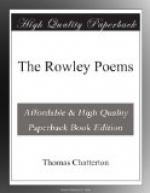A GLOSSARY OF UNCOMMON WORDS IN THIS VOLUME.
In the following Glossary, the explanations of words by CHATTERTON, at the bottom of the several pages, are drawn together, and digested alphabetically, with the letter C. after each of them. But it should be observed, that these explanations are not to be admitted but with great caution; a considerable number of them being (as far as the Editor can judge) unsupported by authority or analogy. The explanations of some other words, omitted by CHATTERTON, have been added by the Editor, where the meaning of the writer was sufficiently clear, and the word itself did not recede too far from the established usage; but he has been obliged to leave many others for the consideration of more learned or more sagacious interpreters.
EXPLANATION OF THE LETTERS OF REFERENCE.
AE stands for AElla; a tragycal enterlude, Ba. ------ The dethe of Syr C. Bawdin, Ch. ------ Balade of Charitie, E. I. —— Eclogue the first, E. II. —– Eclogue the second, E. III. — Eclogue the third, El. ------ Elinoure and Juga, Ent. ----- Entroductionne to AElla, Ep. ------ Epistle to M. Canynge, G. ------- Goddwyn; a Tragedie, H. 1. —— Battle of Hastings, No 1. H. 2. —— Battle of Hastings, No 2. Le. ------ Letter to M. Canynge, M. ------- Englysh Metamorphosis, P.G. ----- Prologue to Goddwyn, T. ------- Tournament,
The other references are made to the pages.
A GLOSSARY.
[B.=Bailey’s Universal Etymological Dictionary (8th ed. 1737). K.=Kersey’s Dictionarium Anglo-Britannicum (1708). Sk.=Prof. Skeat’s Aldine Edition (1871). Speght=Glossary to Speght’s Chaucer (1598). T.=Tyrwhitt. C.=Chatterton’s notes to the poems.]
Abessie, E. III. 89. Humility. C.
Aborne, T. 45. Burnished. C.
Abounde, H. 1. 55. [Evidently avail; K. B. and Speght do not help.]
Aboune, G. 53. Make ready. C.
Abredynge, AE. 334. Upbraiding. C.
Abrewe, p. 281. 60. as Brew.
Abrodden, E. I. 6. Abruptly. C.
Acale, G. 191. Freeze. C.
Accaie, AE. 356. Asswage. C.
Achments, T. 153. Atchievements. C.
Acheke, G. 47. Choke. C.
Achevments, AE. 65. Services. C.
Acome, p. 283. 95. as Come.
Acrool, El. 6. Faintly. C.
Adave, H. 2. 402. [Probably beheld; cannot be explained from K., who has nothing nearer than adawe (O.), to awaken; awoke can hardly be the meaning.]
Adawe, p. 282. 78. Awake.
Addawd, H. 2. 110. [Limply. Sk. translates wakened from B.’s addawe, to waken, which makes no sense. K. has ’adaw, to awaken; but it is used by the poet Spencer to slacken’; hence the meaning I have given.]




